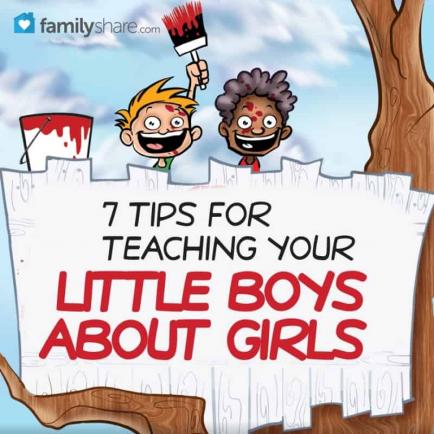
I have three little boys. Since they are young and we are pretty casual around here, there has been a lot of little boy nudity over the last several years. As such, there has been no question about what makes a boy, well"� a boy. In fact, I didn't give much thought to the topic at all until one of my boys asked me, "What makes you a girl, Mommy?"�
Well.
Obviously this is a common question. And it probably gets addressed a lot earlier if you have children of both genders. How we handle this issue can define how our children see the opposite gender, and ultimately affect their personal relationships for many years.
So, no pressure.
Fortunately, there are some straightforward and simple ways to handle this topic without causing your child irreparable damage.
Be accurate
Answering questions will be much easier if your child has an accurate understanding of what you are talking about. Use technical and anatomical terms for your son's body. Call it a "penis"� and "vulva" or "vagina" instead of a "winky"� or "wee-wee."� Using the cutesy words might be funnier, but correct terminology helps lay the foundation for successful comprehension later on. Similarly, your son has nipples, but not "little boobies."� (Yes, I have heard a parent refer to their son's chest as his boobies.)
Be clear
Particularly in the preschool years, this is important. Euphemisms might make you, as the parent, a little less uncomfortable for a little while. But they ultimately cloud the conversation and confuse your child. Pause and think for a moment before answering a question. Glib answers or circuitous, rambling answers are far more confusing for your son.
Be concise
This ties in with the concept of clarity but takes it one step further. Brief answers with simple terms will be better received than long-winded ones. If your son has more questions, he will ask. Don't feel as though you need to address the entire female body and psyche all at once.
Be honest
Yes, there might come a question that is not age-appropriate, but usually simplified versions of the honest answers will be sufficient.
Answer the question that was asked not the question you're afraid of
One of my friends was asked by her 5-year-old son about why his penis sometimes was a little longer and harder. A sufficient answer would have been, "Sometimes your clothing or warm water will touch your penis and make it a little longer and harder." Unfortunately, she delved into a detailed explanation of erections and intercourse with her kindergartner. Their conversation left him confused, as was exemplified by a very inappropriate, out-of-context and physically impossible claim he made at playgroup a few days later.
Be scientific
Approaching the differences between boys and girls as simple facts will help you feel more comfortable with the topic, and make it easier to be fully honest. Wikipedia has a non-sexualized, labeled photograph of nude human bodiesfor side-by-side comparison. I have found this image much more useful than the more common hand-drawn, cross-section illustrations of the internal and external organs.
Emphasize kindness and respect
Young children are programmed to sort through their world, putting things into categories. If your son sees girls as something "different,"� there is a good chance he will - in his mind - categorize girls as something "other"� or "apart."� While it is important to recognize the differences between the genders, it is more important for your son to understand how he should treat girls.
As a preschooler, he needs to know that girls are people and should not be ostracized for their gender. Discourage the "No Girls Allowed"� games. Emphasize that girls and boys are different, yes, but can and should get along.
As an elementary-aged child, he needs to understand privacy, modesty and how to respect and protect those boundaries.
As a tween, he needs to understand how a woman's body works. When your son learns about puberty and the changes in his own body, he needs to learn about the changes in a girl's body, too. Rude and hurtful behaviors can be curtailed if boys know and understand what girls their age are experiencing. A boy who understands the natural development of breasts and menstruation is far less likely to mock, tease, or torment girls for their inevitable development.
Teaching your son about girls can feel embarrassing at first. But through open and honest discussions based on your son's questions, you can teach him to understand and respect the female body.

